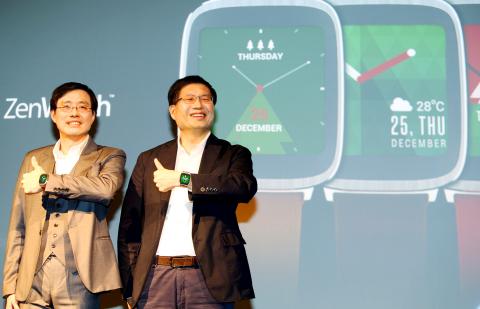Asustek Computer Inc (華碩), the world’s No. 5 PC brand, yesterday said that it plans to introduce two more wearable devices in the second half of next year, seeking to repeat the success of the smartwatch it launched recently in a bid to become one of the world’s top three suppliers of wearable devices.
Asustek’s ZenWatch has been rolled out ahead of Apple Inc’s Apple Watch, which is expected to hit the market early next year.
“ZenWatch is our first wearable device powered by Goolge Inc’s Android Wear system,” Asustek chief executive Jerry Shen (沈振來) said at a product launch for the local market, following the smart device’s overseas debut.

Photo: CNA
Shen said the market reactions to the ZenWatch in the US and Japan have been satisfying. He declined to disclose sales figures.
“Select European countries, China and Hong Kong will be included in the second wave of ZenWatch launches,” he added.
The company said that supplies of the smart device are running short in the US and Japan, which Shen attributed to a components shortage.
Asustek only utilizes 50 percent of its 50,000 units-a-month capacity.
The supply shortage could extend to February next year, Shen said.
Despite this, Asustek is planning to launch the second-generation ZenWatch — which has a voice call function and a smart wristband — in the third quarter of next year.
Asustek hopes that the device, which is priced at NT$5,990, gains popularity in the mass market. That figure is almost half of Apple Watch’s price tag of at least US$349.
Since smartwatches are the first Internet of Things product with foreseeable growth potential, Asustek will strive to become “a key player” in this sector, Shen said.
The company is to boost ZenWatch production in the second half of next year, either to produce the first-generation models, or the second-generation ones, Shen said.
Separately, Shen said that “the weak yen has not affected the revenue ZenWatch has generated for Asustek because the product was launched in Japan in November and the currency appears to have stopped falling since then.”
Asustek’s share price closed down 0.88 percent at NT$337 yesterday, underperforming the TAIEX, which gained 0.97 percent.

Sweeping policy changes under US Secretary of Health and Human Services Robert F. Kennedy Jr are having a chilling effect on vaccine makers as anti-vaccine rhetoric has turned into concrete changes in inoculation schedules and recommendations, investors and executives said. The administration of US President Donald Trump has in the past year upended vaccine recommendations, with the country last month ending its longstanding guidance that all children receive inoculations against flu, hepatitis A and other diseases. The unprecedented changes have led to diminished vaccine usage, hurt the investment case for some biotechs, and created a drag that would likely dent revenues and

Global semiconductor stocks advanced yesterday, as comments by Nvidia Corp chief executive officer Jensen Huang (黃仁勳) at Davos, Switzerland, helped reinforce investor enthusiasm for artificial intelligence (AI). Samsung Electronics Co gained as much as 5 percent to an all-time high, helping drive South Korea’s benchmark KOSPI above 5,000 for the first time. That came after the Philadelphia Semiconductor Index rose more than 3 percent to a fresh record on Wednesday, with a boost from Nvidia. The gains came amid broad risk-on trade after US President Donald Trump withdrew his threat of tariffs on some European nations over backing for Greenland. Huang further

Macronix International Co (旺宏), the world’s biggest NOR flash memory supplier, yesterday said it would spend NT$22 billion (US$699.1 million) on capacity expansion this year to increase its production of mid-to-low-density memory chips as the world’s major memorychip suppliers are phasing out the market. The company said its planned capital expenditures are about 11 times higher than the NT$1.8 billion it spent on new facilities and equipment last year. A majority of this year’s outlay would be allocated to step up capacity of multi-level cell (MLC) NAND flash memory chips, which are used in embedded multimedia cards (eMMC), a managed

CULPRITS: Factors that affected the slip included falling global crude oil prices, wait-and-see consumer attitudes due to US tariffs and a different Lunar New Year holiday schedule Taiwan’s retail sales ended a nine-year growth streak last year, slipping 0.2 percent from a year earlier as uncertainty over US tariff policies affected demand for durable goods, data released on Friday by the Ministry of Economic Affairs showed. Last year’s retail sales totaled NT$4.84 trillion (US$153.27 billion), down about NT$9.5 billion, or 0.2 percent, from 2024. Despite the decline, the figure was still the second-highest annual sales total on record. Ministry statistics department deputy head Chen Yu-fang (陳玉芳) said sales of cars, motorcycles and related products, which accounted for 17.4 percent of total retail rales last year, fell NT$68.1 billion, or